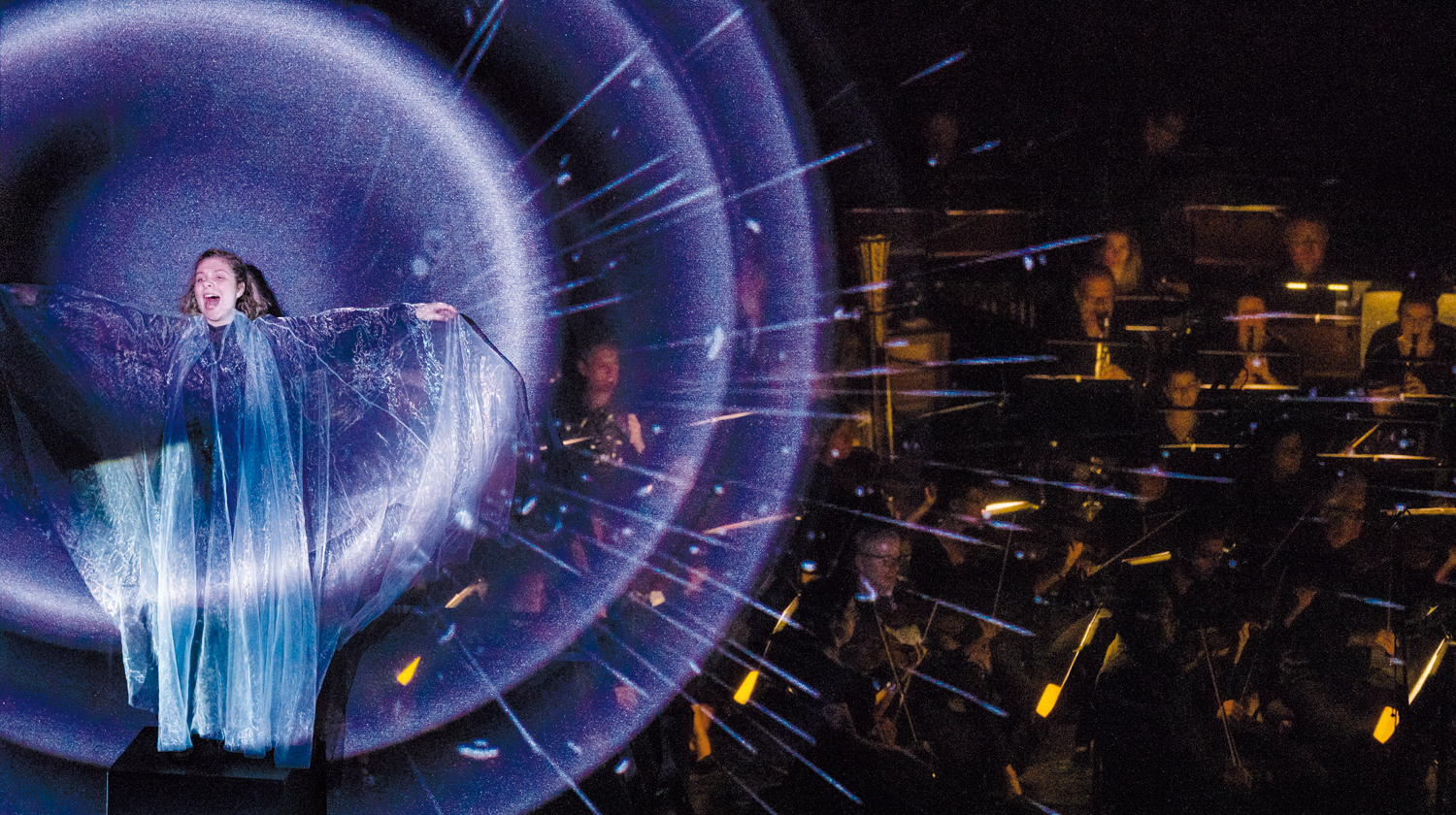

The Royal Opera House Muscat, together with the Opéra de Lyon, presented no less than six performances of Maurice Ravel’s 1925 Lyric Fantasy in two parts, “L’Enfant et les Sortilèges” (The Child and the Spells) using two teams of soloists at the newly opened, House of Musical Arts last week. The first four were private performances, facilitated by the Education and Outreach Department at ROHM exclusively for schools in the Sultanate, while the final two ‘family’ shows at the weekend were open to the public. The running time was less than an hour, but what an assault on all the senses that proved to be!
The concept and video designer, Grégoire Pont, invested inspirational vision in creating a three-dimensional set where the music could breathe behind minimalist sets and costumes, while live illustrations animated the front gauze. The sixty-seven strong orchestra, under passionate Swiss Conductor, Titus Engel, was on the stage behind the drama rather than accompanying unseen from a pit.

The five hundred seat auditorium allowed for free seating so everyone could choose their favourite spot before house lights fell, and a magical calligraphic pen drew the title of the opera across the gauze to the orchestral opening. Woodwind themes announced the spoiled ‘Child’ of the title, performed delightfully by Mezzo, Clémence Poussin, having a tantrum: “I don’t want to do my homework, I want to go for a walk, I want to eat all the cake”. Mother (Mezzo Claire Gascoin) was imaginatively described in a huge, animated hand gesture appearing from the side.
Ravel commissioned the libretto from Parisian Novelist, Sidonie-Gabrielle Colette in 1918, but the world premiere was only given by Opéra de Monte-Carlo in 1925. The score was beautifully interpreted from beginning to end, sometimes in a French impressionistic style sometimes jazz-influenced. A double-bassoon melody introduced, ‘Armchair’, sung by British Bass-baritone, Matthew Buswell with confidence and presence despite his crutches! Opposite him was English Mezzo, Beth Moxon as a temperamental Louis XV Chair. Their furniture persona was drawn around them on the gauze as they sang, while costumes were kept to simple grey. Grandfather Clock’s declamatory complaint was sung with lyrical pacing by Berlin-born baritone, Christoph Engel. The next scene was delightful; a spoof of an English brawl under a London street light in a popular jazz style just evolving in the early 20th century. It was followed by an oriental pentatonic pastiche duet between ‘Teapot’, sung by Breton tenor, Kaëlig Boché and the China Cup, echoed by Celeste and Xylophone in the orchestra.

Margot Genet performed the wordless obligato with superb control in her impossibly high tessitura. In a magical transformation, thirty-four chorus members slipped on stage as shepherds, performing a Country Dance to French folk-music with woodwind and snare drum accompaniment. They bemoan the loss of their “blue dog and pink lambs” which segued seamlessly to the elevated Enchanted Princess from the story book which ‘Enfant’ had of course ripped up during his tantrum. Ms Genet performed a poignantly tender duet with flute obligato, interrupted finally by clarinet arpeggios as she sang how she had hoped he might grow up to be her Prince. Instead he destroyed that dream, but now began to realise the consequences of his actions and showed regret in a solo full of pathos.
The mathematician-on-stilts (Boché) made an impressive entrance along with the chorus. His fast wordy song, full of false arithmetic built up to a climactic crash with amazing visual counterpoint in numbered blackboard sequence. The double-basses and other strings imitated Enfant’s aching, “Oh my Head”. The much-anticipated Cats meowed their way into the garden with purrfect ensemble as clever animation of White Cat (Norwegian Mezzo, Eira Huse) and Black Cat (Christoph Engel) spun a whirling, playful dance-duet in front. Ravel’s masterful impressionistic score is here descriptive of a Cabaret waltz in a Parisian Café, ending in a comical trombone slide climax.
Child is delighted to be in the garden where Bird is depicted playfully by the flute and toy bird-warbler. The Tree, earlier wounded by his knife, was oozing sap and a falling lament was sung tragically in Matthew Buswell’s mournful Bass, echoed by the male chorus of trees, with strong condemnation of destructive Child. A jazzy waltz sequence used a piccolo descant to portray ‘Dragonfly’ as light images were projected around the auditorium itself.

Baby bats squeaked plaintively over the loss of their Mother Bat (killed by Child) sung superbly in her highest register by American lyric Soprano, Erika Baikoff, and again, Enfant began to show elements of remorse.
Tree Frogs then danced their way across the walls to a rhythmic waltz until Tenor, Kaëlig Boché appeared caged as Tree Frog opposite Mezzo, Eira Huse as Squirrel. They sang a delightful duet until Frog jumped — literally — to freedom. The cage was to admire Squirrel’s little hands and eyes better, but which are now filled with tears. Now the Child complains that no one loves him and he is alone; for the first time the evocative, “Maman” is heard as a falling motive. There was an unexplained animal fight in an animated, colourful fantasy, sung by whole chorus in which Squirrel is hurt. The Chorus comment that, ‘Child has bandaged the wounded paw’, as they surround him, now collapsed, like a Greek tragedy. The ending was abrupt and slightly confusing: Animals comment that Child is wise because he saved Squirrel, thus bringing Redemption through one small act of kindness. ‘Maman’ became a magic mantra as the drama closed with beautiful, lush 20th century harmony in the chorale Finale. Ravel wrote his opera for adults, though the profound moral lesson is surely one drawn from ‘the instinctive and violent world of the child’.
PHOTOS BY KHALID AL BUSAIDY
Oman Observer is now on the WhatsApp channel. Click here



